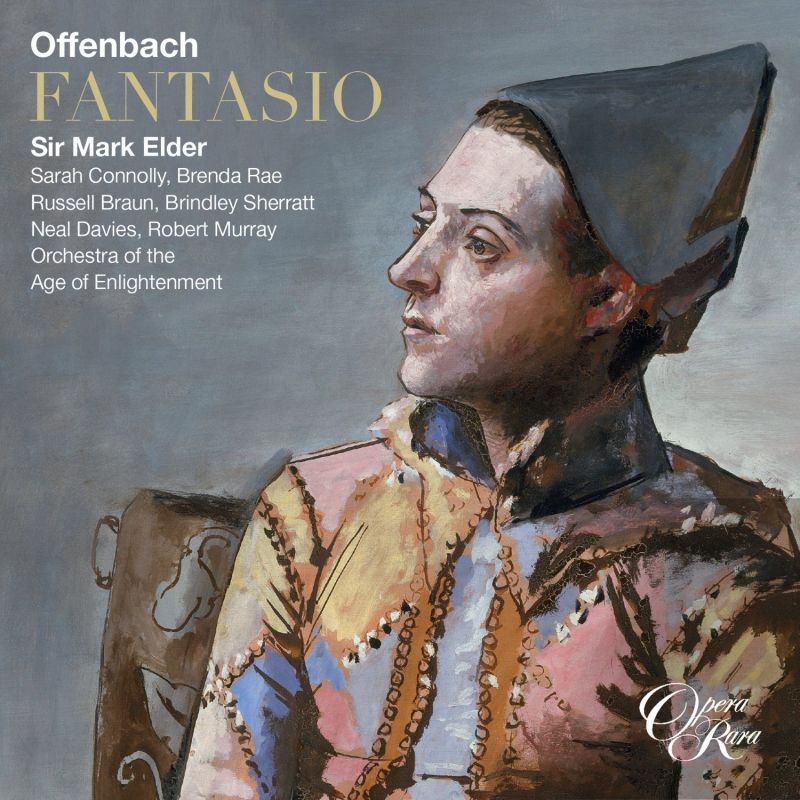OFFENBACH Fantasio
View record and artist detailsRecord and Artist Details
Composer or Director: Jacques Offenbach
Genre:
Opera
Label: Opera Rara
Magazine Review Date: 11/2014
Media Format: CD or Download
Media Runtime: 169
Mastering:
DDD
Catalogue Number: ORC51

Tracks:
| Composition | Artist Credit |
|---|---|
| Fantasio |
Jacques Offenbach, Composer
Aled Hall, Facio, Tenor Brenda Rae, Princess Elsbeth, Soprano Brindley Sherratt, King of Bavaria, Bass Gavan Ring, Hartmann, Baritone Jacques Offenbach, Composer Mark Elder, Conductor Neal Davies, Sparck, Baritone Opera Rara Chorus Orchestra of the Age of Enlightenment Robert Murray, Marinoni, Tenor Russell Braun, Prince of Mantoue, Baritone Sarah Connolly, Fantasio, Mezzo soprano Victoria Simmonds, Flamel, Mezzo soprano |
Author: Richard Lawrence
The origins of the opera lie in a play by Alfred de Musset dating from 1834, reworked by Alfred’s brother Paul for performance at the Comédie Française in 1866. The plot is distinctly odd. Elsbeth, daughter of the King of Bavaria, is due to be married for reasons of state to the Prince of Mantua. Elsbeth is mourning the death of Saint-Jean, the hunchbacked court jester. Fantasio, ‘un simple bourgeois de Munich’, adopts the jester’s costume and gait in order to ingratiate himself with the princess. Meanwhile the prince, anxious to ascertain her true feelings, has exchanged clothes with Marinoni, his aide-de-camp. When the court assembles, Fantasio, perched in a tree, removes Marinoni’s wig. The insult has the intended consequence of deferring the wedding. Elsbeth visits Fantasio in prison where, after some confusion, she returns his love and helps him escape. War threatens: Fantasio’s suggestion that the rulers fight it out between them is nervously rejected by the prince, who withdraws his suit. Fantasio gets his princess, and is proclaimed the King of Fools.
In his booklet-note, Keck avers that the opera ‘deserves to be called a masterpiece’. There are certainly some beautiful numbers, such as the duets for Elsbeth and Fantasio, and the orchestration is a joy: Fantasio’s Ballade in Act 1 highlights the woodwind instruments in turn, from flutes to bassoons, and Elsbeth’s Romance features the clarinet and horn, magically played by Antony Pay and Roger Montgomery. Occasionally there are welcome reminders of past glories: the waltz in the finale of Act 2 recalls ‘Un vil séducteur’ from La belle Hélène, for instance. But the soufflé fails to rise. After the fall of Napoleon III and the Second Empire there was nothing for Offenbach to satirise, and it shows.
There are no reservations about the performers, though. The cast, led by Sarah Connolly and Brenda Rae, is first-rate, and Sir Mark Elder provides faultless direction. The spoken dialogue was recorded elsewhere but there is no discernible change in the acoustic: excellent sound, in fact, save for an over-prominent piccolo. I daresay I’m missing something, so do give this enterprising issue a try.
Discover the world's largest classical music catalogue with Presto Music.

Gramophone Digital Club
- Digital Edition
- Digital Archive
- Reviews Database
- Full website access
From £8.75 / month
Subscribe
Gramophone Full Club
- Print Edition
- Digital Edition
- Digital Archive
- Reviews Database
- Full website access
From £11.00 / month
Subscribe
If you are a library, university or other organisation that would be interested in an institutional subscription to Gramophone please click here for further information.




